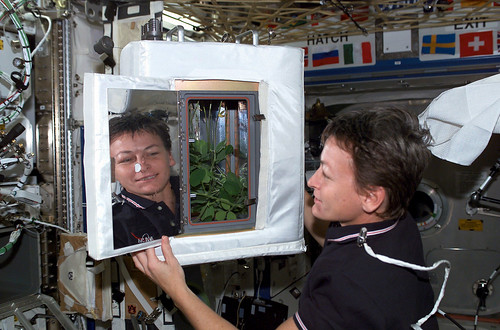
Many kids gaze up into the night’s sky and dream of touching the stars. Peggy Whitson, NASA astronaut and commander of the International Space Station, turned that dream into reality.
Whitson grew up in the small town of Beaconsfield, Iowa, completing standard chores like mowing the lawn and caring for animals, but never lost her determination to fly and eventually go to outer space. At the age of nine, Whitson became involved with the 4-H program. Her brothers and sisters were active with the local Ringgold County 4-H club and it was a natural fit for her. The program played a key role in helping her develop from a shy girl into an exceptional leader.
“Although I didn't particularly have a love of chickens, I was able to raise enough to sell,” said Whitson. “That ‘chicken money’ eventually paid for my private pilot’s license.”
4-H is the flagship youth outreach program of the federal land-grant universities’ Cooperative Extension Service, administered by USDA’s National Institute of Food and Agriculture (NIFA). 4-H provides youth hands-on learning experiences and encourages learning about the world through science, technology, engineering and math (STEM) opportunities. Traditionally, STEM education focused on agricultural science, electricity, mechanics, entrepreneurship and natural sciences. Today, 4-H programs include rocketry, robotics, bio-fuels, renewable energy, computer science and environmental sciences.
Whitson’s space station tour highlights the role in a partnership effort among 4-H, NIFA and NASA to promote STEM education.
“In order to find your limits, it is necessary to step beyond your ‘comfort zone,’ and try new and challenging things. It just might inspire you,” said Whitson. “The 4-H program is one way young people can practice expanding their experiences, knowledge and skills.”
Whitson has completed two six-month tours of duty aboard the International Space Station and returned on Nov. 19, 2016 with Expedition 50/51, where she assumed command of the station. Whitson and her crewmates are performing 250 zero-gravity experiments in areas of biology, Earth science, human research, physical sciences and technology development. She is scheduled to return to Earth in the Spring of 2017.
“We will be using ourselves as test subjects to understand how space flight effects the human body,” said Whitson. “We will also look at plant growth, genetic changes, examining how the lack of gravity effects physical phenomena,” she said.
And just like that… A small town girl is now doing big things. She has a message for today’s youth.
“Where you come from doesn't have to be limiting; extend yourself and anything is possible,” said Whitson. “I dreamed of becoming an astronaut and achieved that dream.”
NIFA invests in and advances agricultural research, education and extension and seeks to make transformative discoveries that solve societal challenges.



